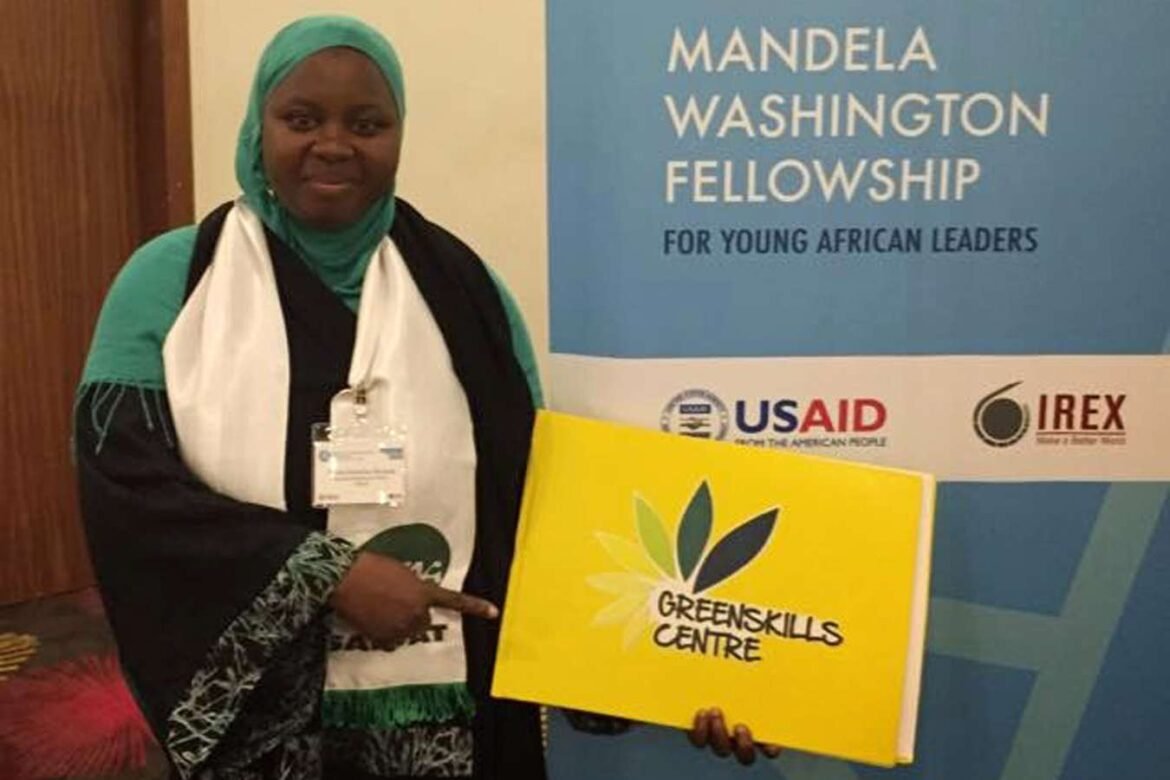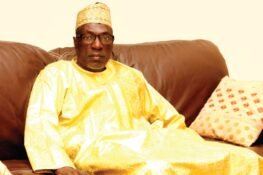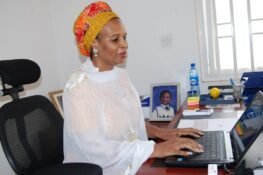An alumnus of the Young African Leadership Initiative, Saidat Abiodun Shonoiki shares deep insights from the opportunities the fellowship has given her and why she is passionate about agriculture. It’s an interview every young farmer must read.
You represent the new wave of Small and Medium Enterprises being built around agriculture in Nigeria. What is new that you have brought into agriculture?
Though I am a registered MSME, this is my professional background. I studied agriculture. But I have found myself promoting sustainable agriculture, some people call it organic agriculture.
What I mean by sustainable agriculture is to practice it in such a way that it is sustainable, that it can stand on its own and you don’t have to keep begging for subsidies.
Also, that you engage in agriculture in such a way that it does not affect the environment. Most graduates of agriculture focus mainly on technical know-how, forgetting the business skill aspect of it.
I have been able to bring up an idea that to can engage in agriculture in such a way that is sustainable, will not affect the environment and also make meaningful impact in the space you are operating by empowering the local community.
It is not only about you. So, when we talk about sustainable agriculture, it is about the economic, social impact, the technical know-how and the environment. That is what I am promoting after my yearly programme with the Mandela Washington Fellowship 2014.
You were part of the Young African Leaders Initiative put together by the US government. How did you get involved in it?
We were the first batch. I saw the advert and I applied for it despite the fact that I had gotten to the age limit. It was a great experience, being together with Young Africa Leaders from other African countries. We were together for like six weeks learning their culture, trying to live with people and learn from their experience, how they interact in their communities.
The yearly programme has also inculcated in me, a habit of volunteering, to have the spirit of volunteerism. It is not about you, it is about giving back to society. And also, I was in the business entrepreneurship track.
I have been able to see a lot of businesses in the United States of America on how they operate. We visited a lot of industries. That has really helped in me on coming back to Nigeria to start my own business.
From a social point of view, what was it like for you going around US universities with other Africans?
The first thing is how you are encouraged to look at things objectively. The way everybody lives is different and you have to show respect to everybody based on where they come from. You had to be open minded and respect other people’s culture and their views. That was something important I picked from my trip to the US with other Africans. And also, the US universities, I like their educational system and the way they focus more on research.
They don’t go into research just to place it on a shelf. It’s about how it will affect the industry. That is a great takeaway I would like our people also look at back home. Our academic institutions should approach research not just as a means to become a doctor or a professor but as an avenue to impact industry.
Do you think the programme has shaped how you run your business today?
Yes. It has. For example, we were at one community where they mine sand. In that community, there is also a glass company. You can see the value chain on how their work is synchronized. They worked together.
The glass company has an agreement with the sand company so that they work hand in hand. Back year in Nigeria, you see an industry, for example in fish farming, you want to raise fish from fingerling to adults, you want to produce fish, basically, you want to do everything yourself.
So, how do you become good at what you do? Specialization is key. Let other people be part of it. Find your own strength and focus on it so that you can be better in that area economically and professionally.
Was your sex a challenge?
No it was not. The programme was based on merit. It was based on what you can do. I have never even thought of that as a challenge. It is the value you place on yourself and the ability to bring it out, and to let people know you’ve got something in you.
Do you think the leadership initiative is a success?
It is a success. You are able to see how things are done in the US while they are growing, their volunteerism, the industries, their public service. It is a pen exposure that money cannot buy.
They have seen in African countries that the youths are the majority. And for us to see Africa change, it has to be through the youths in terms of how they think and how they want to deliver to society. And we are beginning to see the rewards.
Part of it is my own success story, for me to come back and create Green Skills. Now the not for profit sector is growing day by day. That is how development can take place in any country. I have about 14 to 15 countries in Africa that I have a network with. That the people we stayed together with for six weeks. They have created lifelong relationships for us, a family.
What real business value have you been able to get from your expanded network?
We are trying to work on a tree planting project. We are still on it. It’s on in Benin and Ghana that we are talking. When I was Kenya, thank God I met some of them that were able to make my stay very good. But I have not really turned them into business opportunities for now.
You got a grant from the World Bank. What impact did it have on your business?
About that, I have been telling a news organization they should remove the $7million they reported. I didn’t get that; it was N7million. On getting back, somebody from the US actually directed me to see someone at the World Bank and that opened doors for me. I felt this is what I would love to do and I would like to have a training centre to train people on sustainable agriculture.
They said there is a grant; WAAPP, I should apply for it. I had known WAAPP for some time and knew one area of focus was aquaculture. I told them I was a feed miller and I produce feed for fish. From there, I was able to fence the land, drill a borehole, build a training room and two pens.
I added a lot of my own funds to it to make it worthwhile as a training centre. The challenge right now is that we don’t enough clients that are willing to pay for the kind of training and will sustain the center. So, that is still a challenge, for us to run the place sustainably.
Outside of the grant that you got, it is well known that access to finance, particularly from commercial banks is a problem in Nigeria. How have you gotten around it?
For me personally, I don’t think I really have that problem because once your books are intact, once you have a track record and once you can explain what you want to use the money for; access to finance is not an issue.
Most SMEs have this problem because they don’t keep good records, they don’t keep what an investor or financier would like to see in their books. I think that is a major area we the SMEs need to work on. So, I can’t say access the finance is a challenge for me. You take money when you need it.
Your Green Skills Initiative, the same way you have been trained, now you are training other people. Of what use will your training programme be to the society we live in?
I showed you one of my products. One of my objectives for coming up with Green Skills is to be able to create empowerment through cluster development. You know we have the majority of people engaged in agriculture in the rural areas.
Even if we want to develop industry around agriculture, we need to go back to the rural communities because they are the ones that have the patience, have the land to produce things. So, I can achieve this through my programme of training the trainers. I’m partnering with one of the organic agriculture association to start training on the facility.
States in the northern region are partnering with me to use my facility and train people from the north. If we can train people that can go back to their communities and train others, we get significant changes in how people practice agriculture. That is one of the ways we want to train and empower people.
In agriculture, skill is an issue. We are importing skills from Togo, from Benin to work on our farm, while we have youths a that are still roaming about. So, we need to empower them with the necessary skillset for them to deliver what is needed in agriculture. And you can see agriculture is in the air. They are all talking about it. But where do we find the relevant skills to be able to deliver on our farms? That is an issue we still need to work on.
The government itself has a number of programmes to train young people and also develop SMEs. But a lot of the programmes tend to fail because the people they train or empower don’t have the passion. They don’t have the ambition. How do you pick the people you choose to train?
If you look at my book divider about Green Skills, there is a requirement that people will need to meet and put in an application. We want to hear from applicants if they are really interested in this and what is the objective after the programme.
This is the way we can scale down applicants and discover the people that are really interested. That is why I am saying, I focus on training the trainer, not just the people that are out to get free money for attending such programmes. Is it because they are interested in the bulk money that government is going to pay? Who are the people training, who are we training – these are the questions we need to ask. That is my focus.
I have an agricultural background, I have been practicing for the past 15 years; I know what it means. I have entrepreneurial skills, so I know what is necessary. And also, I am an NLP practitioner in terms of personal development, I can know who is ready to take agriculture to the next level.
Part of what we train them on is about personal development, their goals. Are they interested or they just want to do it? Agriculture is about loving what you are doing. So, we have a requirement that they will fulfill, that they will write like we did in the yearly programme. It will help in screening the right people.
You have a fish farm, a poultry, and you also make animal feed. Is Nigeria ready for large scale consumption of animal feed?
Why are we importing chicken? Why are we importing fish? There is even a shortage in the supply of fish in Nigeria, not to mention chicken. It is not that we cannot produce it, but we still need that political will to be able to grow the local industry.
As long as people eat chicken meat and fish, there will always be need for animal feed. That is the truth. And we can see a lot of people, they are looking for business in Nigeria and partner with others in the field of agriculture. And, if you look at the agriculture exhibition here in Abuja, you see there are almost ten companies here to market animal feed equipment. So, there is need to production of animal feed.
Still on the animal feed, today there is a lot of violence in Nigeria over available land for farming and grazing of cattle. Can animal feed bridge that gap and replace the need for grazing land?
In September, I was in Netherlands and I was in one of the areas where milk is produced in large quantities. I was there on an instant protein training. If you see the cows; if you see the udder for milk…the cows don’t roam about. It is just a very big land with light electricity fencing and they have access to food.
They are given high yield. How we can change the perception of people is right from here. But the government has to provide infrastructure. I know that in the Netherlands, they invested in infrastructure. The water source has to be developed. So, it is possible. We were at a company that produces the feed too. They produce in very large quantity. That is the way to go.
“Be clear about what aspect of agriculture you want to go into because it is very wide. Where do you want to be? Do you want to be a grower, do you want to be a marketer, a processor or a livestock breeder? Just be clear and after you are clear, be an apprentice, learn then practice it.”
Do we need to educate herders in the country on the modern way of breeding cattle?
I know some of them are better informed. It is just for government to have a kind of demo grazing area to let them see that they can benefit more without taking their cattle all over Nigeria. They can get more money. So, we should hear from them. What are they even yearning for? Is it because they will spend so much money on feed? Hear from them, lets know how they think before we can provide solutions.
Meat is very important in the Nigerian diet and it out of the reach of the poorest Nigerians. You are a nutritionist. What impact will breeding cattle on animal feed have on the cost of meat?
It about analyzing the cost benefit. When you walk around, you tend to burn food. It is what you give in that you get out. If you feed very well, you get better meat. So, I don’t think meat will become too expensive.
There are grasses that you can grow in the ranch, that can also give good yield. And, it when government is able to demonstrate that if you stay here, this is what you make. Do you know that food is cheaper in most of these countries than it is in Nigeria?
Why do you think that is?
Because they have economies of scale, they have done a lot of research and have invested in technology. That is why they can compete well in the international market.
There is the debate about the safety of genetically modified foods. From the places you’ve been around the world, you must have come across it, you have talked about it. What is your opinion?
I am not an advocate of GMO. I don’t like it. I believe in natural food. You can upgrade them through hybrid or through selective breeding. It is ethical and it is different from GMO.
For example, you have good maize here that is resistant to pest. And you have another kind of maize that is not resistant. What you do is a kind of pollination.
It’s like an Igbo person marrying a Yoruba or Hausa marrying Yoruba. Are they not from the same origin. It is when you take something from an animal to a plant, it is totally different. The genetic makeup is totally different. That is why I think GMO is unethical.
You run three different enterprises. You grow organic food. Aren’t most foods in Nigeria organic?
Organic food is natural, no artificial addition, no chemical, pesticides or chemical fertilizers and also not affecting the environment. This is a healthy choice for people.
When you spray pesticides on a farm and cover your nose with a mask, what does it mean? What you are spraying is harmful and yet you are spraying it on the food. And we have natural substitutes. Your dogonyaro is all wasting. The leaf is a natural pesticide. Our ginger and garlic are natural pesticides. Our black soap is a natural pesticide.
It is the damage we have done to the land that is now coming back to harm us. And we now want to use another chemical to solve the problem. If you look at the Sustainable Development Goals and read all the 12 goals, everything is about protecting the climate and environment, while living and producing responsibly. That is what organic food is all about, only expressed in different words.
Looking at the tomatoes that you grow, they don’t really look natural. Why is that?
They are natural. That is big beef. It is a hybrid product. I said earlier that hybrid is allowed in organic food production. Even if you have organic seeds and produce them in an inorganic way, it is stamped inorganic. If you have organic crops and you spray them using chemical fertilizers, it is inorganic.
We have a challenge in this country. We are losing our natural seeds, our own indigenous seeds. That is why we keep buying from outside. So, it is a kind of hybrid tomatoes and I buy from Johnny Seeds. They are organic based online platform that sell seeds. I am sure of what I am selling.
Do your trainees put their acquired knowledge into practice?
Yes, they do. I like to work with interns that want to learn from me. And I have quite a number of people starting their own business. They have seen the way I do business, they have seen the way I am restless to get things done. They are practicing it and I hope to do more. I hope to really start on a larger scale and train people on how grow things and engage in agriculture. That is my aim.
You are been touted by a number of international organizations as a successful entrepreneur. How would you rate your business, and do you have plans to expand?
Maybe they see me like that, but I am still a struggling entrepreneur. Maybe they just see the passion in me because I am yet to see the money. But I just love what I do. That is what I do but I am still a struggling entrepreneur. You know about the business climate in Nigeria. We are still struggling.
I can’t really say but in terms of experience, maybe I have learnt a lot of things. Maybe that will bring money later. I can suggest doing business like this or this is not how to do it and so on. That is basically where I can try to help other people, by being a mentor based on my experience.
What do you think it would take for you to expand your business?
For now, I love to have a standardized Eco-center for training people. They can come in, see how to be engaged in organic farming and to be able to get back to their communities and train other people. That will give me the fulfillment, to train people in sustainable agriculture as much as I know. I would want my feed company to be open to equity investors to take the business to the next level.
What about policy wise, what do you think the government can do? Today we have seen little things like curbing the importation of rice come into affect.
What the government has done with rice and its production is growing, they should also try to support SMEs and other products especially our livestock like chicken. They should expand that policy to other products so that we can grow the local industry. I see there is a lot effort in rice and we are really seeing the difference. I would love government to make our institutions more practical. We need skills in agriculture, relevant skills and not outdated skills.
The skills we need should compete internationally. That is one policy area that the government needs to look at. They should also work with research and academic institutions. They shouldn’t do research that are not industry based or needed by industry. They need to work on that so we can make improvements in Nigeria in development, in technological advancement and everything.
We need a link between researcher, academic institutions, the industries and private sector so that we can determine what we need. We need industrial parks. I have been hearing of industrial parks but how affordable are they to the SMEs?
How much time do you devote to running your business?
I am a family person. As a self-employed person, you are free. You can do things at your convenience. On average though, I devote about five to six hours a day to my business. The rest of the time, I devote to my family and myself. Now, I am at a level that I work strategically. It is not about doing things again. It is about giving people direction.
For anyone that would like to follow in your footsteps, where do they start from?
First, they should be sure why they would like to go into it. That should be clear. Money will come later, but you need to know your conscience is clear. Agriculture comes with its own headache so when the going gets tough, are you going to persist?
Be clear about what aspect of agriculture you want to go into because it is very wide. Where do you want to be? Do you want to be a grower, do you want to be a marketer, a processor or a livestock breeder? Just be clear and after you are clear, be an apprentice, learn then practice it. Then you can start doing the business.








